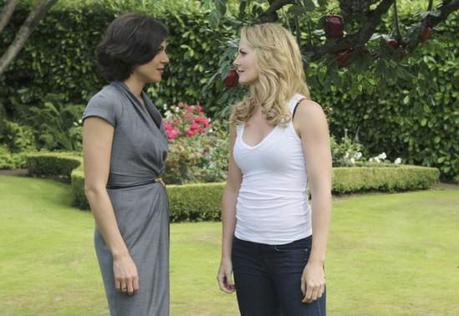Contributor: Edmund B.
“Once Upon A Time” has a tricky balance to maintain, between the present-day world that is and the fairy-tale world that was. Being the creation of “Lost” veterans Edward Kitsis and Adam Horowitz, the hope is that, as in that predecessor, the past will reflect and illuminate the present. With the second episode, “The Thing You Love Most”, that hope is being fulfilled. The payoffs may be more literal and less mysterious, as befits the genre, but are still satisfying.

In this episode, the ramifications of Emma Swan’s decision to stay in Storybrooke come to the fore, which places the focus squarely on Regina, the mayor and former evil queen. The clash between them over Henry and, ultimately, the town are the heart of the show. Here, her machinations to drive Emma back to Boston all come to naught, an early sign, perhaps, that her ‘victory’, her attempt to create a world where she can finally triumph, is starting to unravel.
The flashbacks focus on how she engineered that victory. The show continues its strength of presenting the fairy-tale characters as human beings. It turns out the queen crashed the Charming wedding more out of angry pique than planning. One of the pleasures of the pilot was the war council, with its realistic deliberations. Here we see its flip-side, as Regina struggles to make good on her rash threat. In this take on fairy tales, even the magic mirror doesn’t have the answers on how to do that.
Extreme threats require extreme measures. Dark curses aren’t just plucked from a (black) hat. They must be wrested from friends who now fear their power and cost. They demand payment in the form of the titular “thing you love most”. This is not a world without consequences. The queen succeeds, but at a cost that renders the victory hollow.
In the world the queen created, the townspeople are being introduced slowly, as Emma finds her way to them. This time, Regina’s attempts to run her afoul of the law brings her into Sheriff Graham’s orbit. Regina’s sway over the residents is variable. The newspaper editor is fully in thrall, the sheriff much less so. He is definitely a potential ally (and probably more besides).
She also runs up against Henry’s therapist, Dr. Hopper. He is more willing to do Regina’s bidding, but the setup is rather ham-fisted. Regina prefers the direct approach; she hasn’t quite mastered subtler approaches. Using the doctor keeps alive the idea that this is all in Henry’s head. Emma is playing along, out of concern for Henry, but hasn’t fully accepted the tale. The signs that point towards the more fantastic interpretation, the stopped clock, the fuzzy memories, could have mundane explanations. Even the vibrant, realistic images of the fantasy world may only serve to seduce the viewers, before they find themselves in the latest variation of the finales of “St. Elsewhere”, or “Neon Genesis Evangelion.”
How far the writers can go in maintaining this tightrope act rests with how they handle two characters, Regina and Mr. Gold. Robert Carlyle offers up a toned-down version of his slinky, oily Rumplestiltskin as Mr. Gold. While he may appear to share outside knowledge with the Mayor, and his alter ego’s fixation on names, he could just be an enterprising wheeler-dealer angling for an advantage over his cold, power-hungry patron.
This show has really drawn me in. It has turned out to have depth below its surface glitz. The cast is excellent, especially the central duo of Jennifer Morrison and Lana Parilla. Ginnifer Goodwin’s Snow White/ Sister Mary is still a bit of a cipher, but I expect that to change as the focus shifts to her in upcoming episodes. Especially if they succeed in keeping us guessing, this show promises a very entertaining run.
Writing: 2/2
Acting: 2/2
Direction: 2/2
Style: 2/4
Final Rating: 8/10

